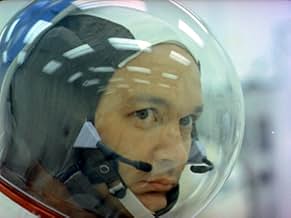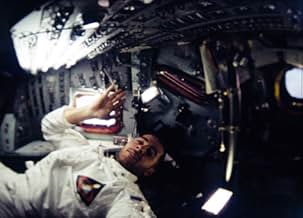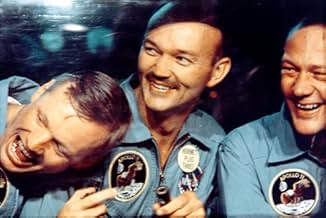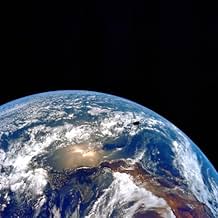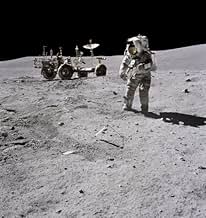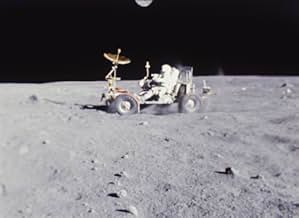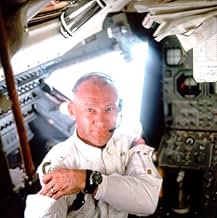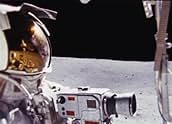AVALIAÇÃO DA IMDb
8,0/10
7 mil
SUA AVALIAÇÃO
Adicionar um enredo no seu idiomaThe crew members of NASA's Apollo missions tell their story in their own words.The crew members of NASA's Apollo missions tell their story in their own words.The crew members of NASA's Apollo missions tell their story in their own words.
- Prêmios
- 6 vitórias e 13 indicações no total
Jim Lovell
- Self
- (as James Lovell)
Edgar D. Mitchell
- Self
- (as Edgar Mitchell)
Dave Scott
- Self
- (as David Scott)
William Anders
- Self
- (cenas de arquivo)
Neil Armstrong
- Self
- (cenas de arquivo)
Stephen Armstrong
- Self
- (cenas de arquivo)
Viola Armstrong
- Self
- (cenas de arquivo)
Jules Bergman
- Self
- (cenas de arquivo)
Frank Borman
- Self
- (cenas de arquivo)
Roger B. Chaffee
- Self
- (cenas de arquivo)
Yuri Gagarin
- Self
- (cenas de arquivo)
Avaliações em destaque
10se7en187
I saw this at the Traverse City Film Festival and it was quite the thrill.
Another great documentary about the Apollo program and the astronauts that went to the moon. Some very interesting and inspiring interviews including incredible actual footage of the Apollo 11 mission as it traveled from the Earth to the Moon.
The film contains interviews from many of the astronauts, Mike Collins (the astronaut from Apollo 11 that didn't walk on the moon) was probably the highlight, he was so funny and entertaining. I was a little disappointed that Neil Armstrong wasn't interviewed, but oh well, it was still very good.
Captivating, fun, and an excellent score, I'm sure people will enjoy this well made film.
Another great documentary about the Apollo program and the astronauts that went to the moon. Some very interesting and inspiring interviews including incredible actual footage of the Apollo 11 mission as it traveled from the Earth to the Moon.
The film contains interviews from many of the astronauts, Mike Collins (the astronaut from Apollo 11 that didn't walk on the moon) was probably the highlight, he was so funny and entertaining. I was a little disappointed that Neil Armstrong wasn't interviewed, but oh well, it was still very good.
Captivating, fun, and an excellent score, I'm sure people will enjoy this well made film.
Saw this film at Sundance, the screening reserved for the Grand Jury World Documentary Award Winner. Wow! I have seen many of the preceding documentaries on the history of the American space program, the Apollo program in particular. Where this documentary exceeds all previous efforts was in revealing the humanity of the astronauts. Most other documentaries focus on the politics which motivated and technical hurdles overcome in the American space program. David Sington brilliantly uses only the astronauts voices for narration of facts and more with newly released footage from NASA, as well as a lot of footage we've all seen before. Because of the free rein given to the astronauts in the interviews, you see many sides of each revealed. For instance, Mike Collins (who has heretofore rarely been interviewed) reveals wonderful humor and joy in his accomplishments. You find out more about their worries and fears, how they look back on their work and what they were thinking at the time. They are all revealed as nice guys with whom you would want to spend an afternoon.
Strangely absent, but it works well in the end, was Armstrong. He gives virtually no interviews. In a way, having everyone else talk about him is maybe better than him talking.
And, the various conspiracy theories are dealt with in the end credits. This is a great place to do it. In films we sometimes see the end credits used for humorous out-takes, epilogue commentary, and so forth. By dealing with the conspiracy theories in an appended manner during the credits, the film refuses to elevate them to the level of legitimacy that the remainder of the facts and biographical material, yet still dismisses them. The single best dismissal is this: If it was all faked, why did they fake it so many times? Wouldn't once have been enough?
See this film when it comes to your neighborhood theater, as it has been announced as having a distribution deal. It is worth seeing on the big screen for its amazing visuals.
Strangely absent, but it works well in the end, was Armstrong. He gives virtually no interviews. In a way, having everyone else talk about him is maybe better than him talking.
And, the various conspiracy theories are dealt with in the end credits. This is a great place to do it. In films we sometimes see the end credits used for humorous out-takes, epilogue commentary, and so forth. By dealing with the conspiracy theories in an appended manner during the credits, the film refuses to elevate them to the level of legitimacy that the remainder of the facts and biographical material, yet still dismisses them. The single best dismissal is this: If it was all faked, why did they fake it so many times? Wouldn't once have been enough?
See this film when it comes to your neighborhood theater, as it has been announced as having a distribution deal. It is worth seeing on the big screen for its amazing visuals.
The Apollo moon landings of the late 1960's and early 1970's have been the subject of countless documentaries over the nearly forty years since they occurred. Of all of them, only two films have captured the spirit of Apollo and of the men who took the journey. One of them is Al Reinert's 1989 masterpiece For All Mankind. The other is this film: In The Shadow Of The Moon. And this film easily rivals For All Mankind for the position of best Apollo documentary.
This film takes the idea behind For All Mankind and takes it to the next level. For All Mankind showed us the astronauts as they were then with narration from interviews. In The Shadow Of The Moon, as I wrote, goes the next step further. It shows the astronauts not only as they were, but as they are now. The difference is often times amazing. To go from young fighter pilot to being one of the few men to have left our planet must have been an amazing journey as the film shows and these men prove it. Like For All Mankind, their narration and appearances are the heart and soul of the story being told.
The body of the story is the footage. Where as For All Mankind brilliantly combined all the footage into one large mission, this film doesn't to a degree. It shows us highlights from the program including Apollo 8 and Apollo 11 and then makes a conscience effort not to confuse missions together. This allows for clarity that many have complained about being missing from For All Mankind. But this clarity also allows for something else as well. It allows for depth in story.
That depth can be felt. The truly great thing about this film is that these images, which so many of us are use to seeing on a small television screen, are shown on a big screen. Only on a big screen can one see and feel the depth of the journey that was Apollo. The film has the ability to take images seen many times and bring context and emotion to them. In particular, the footage and still images of the Earth as taken by the astronauts is awe-inspiring. In fact, seeing the famous Earth-rise image from Apollo 8 brought me to tears. And for once, I am not ashamed to admit it.
To be frank, In The Shadow Of The Moon is an amazing piece of work. Not since For All Mankind as a film of any size, shape, or form captured the spirit of Apollo. This is a film about a dream, the men who lived it, and its legacy not only for them but for us as well. I beg you to see this film. Only after that and viewing For All Mankind can one understand not only the legacy of Apollo but our need to explore Space.
This film takes the idea behind For All Mankind and takes it to the next level. For All Mankind showed us the astronauts as they were then with narration from interviews. In The Shadow Of The Moon, as I wrote, goes the next step further. It shows the astronauts not only as they were, but as they are now. The difference is often times amazing. To go from young fighter pilot to being one of the few men to have left our planet must have been an amazing journey as the film shows and these men prove it. Like For All Mankind, their narration and appearances are the heart and soul of the story being told.
The body of the story is the footage. Where as For All Mankind brilliantly combined all the footage into one large mission, this film doesn't to a degree. It shows us highlights from the program including Apollo 8 and Apollo 11 and then makes a conscience effort not to confuse missions together. This allows for clarity that many have complained about being missing from For All Mankind. But this clarity also allows for something else as well. It allows for depth in story.
That depth can be felt. The truly great thing about this film is that these images, which so many of us are use to seeing on a small television screen, are shown on a big screen. Only on a big screen can one see and feel the depth of the journey that was Apollo. The film has the ability to take images seen many times and bring context and emotion to them. In particular, the footage and still images of the Earth as taken by the astronauts is awe-inspiring. In fact, seeing the famous Earth-rise image from Apollo 8 brought me to tears. And for once, I am not ashamed to admit it.
To be frank, In The Shadow Of The Moon is an amazing piece of work. Not since For All Mankind as a film of any size, shape, or form captured the spirit of Apollo. This is a film about a dream, the men who lived it, and its legacy not only for them but for us as well. I beg you to see this film. Only after that and viewing For All Mankind can one understand not only the legacy of Apollo but our need to explore Space.
Powerfully put together NASA documentary highlights Apollo 11's historic run amongst other aged adventurers often stirring recollections.
Undoubtedly this is some of the finest public extraterrestrial footage ever married into film, and for that alone this noble salute to a bygone America and the heroes that inhabited it is a must see. Taking a trip to the moon with these brave astronauts has never been captured as intimately, helping viewers begin to feel what it must be like to be looking down from space like never before.
Combined with excellent musical scoring, David Sington's emotional remembrance and vicarious lift-offs belongs in many, many star watcher's collections.
Undoubtedly this is some of the finest public extraterrestrial footage ever married into film, and for that alone this noble salute to a bygone America and the heroes that inhabited it is a must see. Taking a trip to the moon with these brave astronauts has never been captured as intimately, helping viewers begin to feel what it must be like to be looking down from space like never before.
Combined with excellent musical scoring, David Sington's emotional remembrance and vicarious lift-offs belongs in many, many star watcher's collections.
This recently-released documentary had some fantastic footage in it, and a very personal look at many of the astronauts who went to the moon. Overall, that is a very exclusive club: only about a dozen men ever did it in the history of the world and just eight or nine ever stepped foot on it. Most of them are still alive and they discuss their adventures, insights and personal feelings here.
One gets the feeling that the rest of us will never know exactly how beautiful the moon is except to take the astronauts' words about it, because even the pictures on this DVD can't convey that. It just looks dull and gray, but the men say it was spectacular. I believe them.
Since this documentary is about 100 minutes long, you get a lot of information. You also get reminded how close two of the three men who went up on that historic first walk on the moon almost didn't get home alive.
A glaring absence in this documentary - through no fault of the film-makers, is the most famous astronaut of them all: Neil Armstrong, the first man to step foot on the moon! Apparently, he did not want to be part of this film. One of the astronauts, near the very end of this documentary, mentions something briefly about Armstrong being somewhat of a "recluse" now and it "being understandable with what he's gone through." From what I've read, a lot of people have tried to make money off him in shady ways and so now he's withdrawn from the public spotlight. Still, not having his thoughts on this historic mission is a real loss to this film and makes this story seem incomplete.
After a slow first half hour, this really picks up when we travel along with Armstrong's Apollo 11 crew. Seeing slow-motion pictures of the lift-off and great shots of the earth are just awesome. The worldwide reaction to the success of this mission will bring a tear or two to your eyes.
This film, a legacy to the Apollo program and the brave men who ran it, should be in every schoolroom. It would make history a lot more interesting to students.
One gets the feeling that the rest of us will never know exactly how beautiful the moon is except to take the astronauts' words about it, because even the pictures on this DVD can't convey that. It just looks dull and gray, but the men say it was spectacular. I believe them.
Since this documentary is about 100 minutes long, you get a lot of information. You also get reminded how close two of the three men who went up on that historic first walk on the moon almost didn't get home alive.
A glaring absence in this documentary - through no fault of the film-makers, is the most famous astronaut of them all: Neil Armstrong, the first man to step foot on the moon! Apparently, he did not want to be part of this film. One of the astronauts, near the very end of this documentary, mentions something briefly about Armstrong being somewhat of a "recluse" now and it "being understandable with what he's gone through." From what I've read, a lot of people have tried to make money off him in shady ways and so now he's withdrawn from the public spotlight. Still, not having his thoughts on this historic mission is a real loss to this film and makes this story seem incomplete.
After a slow first half hour, this really picks up when we travel along with Armstrong's Apollo 11 crew. Seeing slow-motion pictures of the lift-off and great shots of the earth are just awesome. The worldwide reaction to the success of this mission will bring a tear or two to your eyes.
This film, a legacy to the Apollo program and the brave men who ran it, should be in every schoolroom. It would make history a lot more interesting to students.
Você sabia?
- CuriosidadesOf all the astronauts who appeared in the film, only Buzz Aldrin demanded to be paid.
- Erros de gravaçãoThe 1202 alarm was not a programming error in the Apollo Guidance Computer, but rather a hardware design bug, already documented by Apollo 5 engineers. Since the 1202 alarm had occurred only once during testing, NASA decided to go with the radar hardware with known problems instead of using untested newer alternatives with unknown problems.
- Citações
Jim Lovell: We changed our plans on Apollo 8. They changed the mission from an Earth orbital type to a flight to the Moon. And it was a bold move. It had some risky aspects to it. But it was a time when we made bold moves.
- ConexõesAlternate-language version of Universum: Im Schatten des Mondes (2009)
Principais escolhas
Faça login para avaliar e ver a lista de recomendações personalizadas
Detalhes
- Data de lançamento
- Países de origem
- Centrais de atendimento oficiais
- Idiomas
- Também conhecido como
- In the Shadow of the Moon
- Empresas de produção
- Consulte mais créditos da empresa na IMDbPro
Bilheteria
- Orçamento
- US$ 2.000.000 (estimativa)
- Faturamento bruto nos EUA e Canadá
- US$ 1.134.358
- Fim de semana de estreia nos EUA e Canadá
- US$ 38.281
- 9 de set. de 2007
- Faturamento bruto mundial
- US$ 2.161.369
- Tempo de duração1 hora 40 minutos
- Cor
- Mixagem de som
- Proporção
- 1.85 : 1
Contribua para esta página
Sugerir uma alteração ou adicionar conteúdo ausente

Principal brecha
By what name was Na Sombra da Lua (2007) officially released in India in English?
Responda





